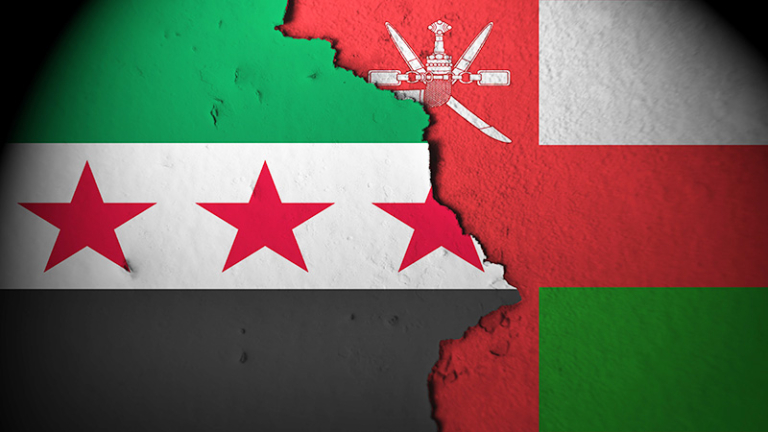
The abrupt end of 61 years of Baathist rule in Syria on December 8 caught the Gulf states by surprise. Both governments and citizens of the Gulf Cooperation Council (GCC) members did not foresee the Syrian Army melting away as rebel forces took one city after another amid an 11-day Hay’at Tahrir al-Sham (HTS)-led lightning offensive that toppled the regime of Bashar al-Assad. Now that Assad is gone, the Gulf Arab monarchies are pragmatically engaging the new Islamist rebels-turned-rulers in Damascus in order to promote regional stability, to help preserve the country’s territorial integrity, and to prevent power vacuums from emerging amid a delicate transition.
Oman’s reaction to Syria’s dramatic changes is particularly interesting because it was the only GCC member to never fully downgrade diplomatic relations with Damascus throughout the civil war. Although Muscat withdrew its ambassador in 2012 in accordance with Arab League decisions to ostracize the Assad regime, Oman never fully severed ties with Syria. It reinstated its ambassador to Damascus in 2020. Now, Oman is keeping a relatively low profile as it assesses the nature of HTS rule and the implications of the regime change for the region, and will seek to align its policies with its fellow GCC states. Following a geopolitically neutral and “friends-of-all” foreign policy, the Sultanate is responding with characteristic caution, while for its part, Omani society appears more divided about Assad’s ouster.
Oman’s Stance Toward the Syrian Civil War
Oman’s position toward the Syrian civil war was that the conflict required a diplomatic solution, which meant engaging with Assad’s government—something that Oman did throughout the crisis. In 2015 and again in 2019, then-foreign minister Yusuf bin Alawi bin Abdullah visited Damascus to meet with his Syrian counterpart, Walid al-Mouallem, and with Assad to discuss diplomatic solutions to the conflict. In 2020, Oman became the first GCC state to reinstate its ambassador in Damascus. In 2023, Oman hosted Assad for an official visit, and in recent years sent many high-ranking Omani representatives to Damascus to participate in business forums on post-war reconstruction. Muscat aimed to demonstrate keenness to support Assad’s rehabilitation as a “legitimate” head of state and to shore up Syria’s position in the wider Arab-Islamic world. Indeed, as one analyst wrote in 2022, Oman became the “chief architect of Arab normalization with Syria.”
Assad’s toppling forced Oman’s leadership to accept Syria’s new reality and to deal with it pragmatically.
As recently as eight days before the Assad regime fell, Omani Foreign Minister Badr Sayyid Albusaidi spoke with Syria’s former Foreign and Expatriates Minister Bassam al-Sabbagh about “developments on the Syrian scene” and expressed the Sultanate’s “solidarity with Syria.” Nonetheless, Assad’s toppling forced Oman’s leadership to accept Syria’s new reality and to deal with it pragmatically. On January 1, 2025, Albusaidi had a phone call with Syria’s newly appointed Minister of Foreign Affairs Asaad Hassan al-Shaibani, in which he emphasized Oman’s “firm and supportive position to respect the will of the Syrian people” while stressing the need to preserve Syria’s “unity and territorial integrity.”
The Omani government’s reaction to regime change in Syria is consistent with two key pillars of the Sultanate’s foreign policy: equidistant relations with all countries in the Middle East and non-interference in other states’ internal affairs. Omani officials are committed to maintaining positive relations with post-Assad Syria, a move with historic precedence for the Sultanate.
Oman had close ties with the Shah’s Iran, but managed to maintain a warm relationship with the Islamic Republic after the 1979 Revolution. Similarly, Oman was close to Egypt under Hosni Mubarak, yet did not join the United Arab Emirates and Saudi Arabia in opposing the successor government led by President Mohammed Morsi and his Muslim Brotherhood-linked Freedom and Justice Party following Mubarak’s 2011 ouster. Oman stresses that its relationships are with countries irrespective of which regime is in power. Muscat deals with the government in power in each country, working to secure friendly ties with whichever regime is in charge.
Different Narratives about Regime Change in Damascus
In contrast to the government’s relatively straightforward response to Assad’s fall, the reaction from Omani society is more complicated, with three main popular narratives emerging in the past month.
The first narrative is advanced by Omanis who support the Iran-led “Axis of Resistance” and see Assad’s fall as a negative development for the Arab world. Like other Arab countries, Oman has segments of its population who believe that Arabs and Muslims should support the Islamic Republic for its perceived commitment to the Palestinian cause. These pro-Iranian Omanis believe that the Iran-Syria-Hezbollah axis was critical to countering Israel. Indifferent to the Assad government’s atrocious human rights record, this narrative views the fallen regime as noble for its long alliance with Iran and its previous political and military support of Lebanon’s Hezbollah, Hamas, and Palestinian Islamic Jihad.
This trend has been prevalent among Oman’s Shia minority and Arab nationalist circles, where Assad’s fall has fueled much anger. Omanis who agree with this narrative are convinced that the CIA and the Mossad orchestrated the Syrian leader’s ouster to bring down the Axis of Resistance and to consolidate Israeli dominance over the Arab region. These Omanis fear that post-Assad Syria will become ‘another Jordan’ or ‘another Egypt’—meaning Arab countries bordering Israel that maintain formal ties with it and do nothing more than officially condemn Israel’s dehumanization of Palestinians, while not providing assistance to resistance groups in Palestine or elsewhere.
The second popular narrative supports the overthrow of Assad because of his regime’s tyranny. This narrative portrays the 2024 Syrian revolution as fundamentally righteous. Its adherents are convinced that the HTS leader Ahmed al-Sharaa (a.k.a. Abu Muhammad al-Joulani) is genuine when he speaks about his ideational transformation and HTS’s commitment to inclusivity and moderation—despite his former outfit Jabhat al-Nusra’s record of intolerance, extremism, and brutality in earlier stages of the Syrian civil war. Turkish President Recep Tayyip Erdoğan and the “Turkish model” of “Islamist democracy” are popular among these Omanis, who are optimistic about Syria’s post-Assad future.
A third narrative maintains that Assad was a thuggish leader whose regime had lost legitimacy, but posits that tyrannical Islamist rule could replace the fallen secular regime. Segments of Oman’s population, particularly liberal elites, who subscribe to this narrative fear the rise of Islamists and jihadists in the Middle East and worry that HTS’s ascendancy will empower the Muslim Brotherhood, and other Islamist movements, including in the Gulf sub-region.
The Post-October 7 Environment
While Omani society appears divided over Assad’s fall, Omanis are more united in their anger over Israel’s military aggression against Syria since December 8. This shared rage must be understood within the context of Omanis’ increasing anger toward Israel. Images and stories from Gaza since October 2023 have had powerful effects on Omani society, leading to growing anti-western sentiments. Many Omanis believe that Israel’s conduct in Syria since Assad’s fall, including ground incursions and airstrikes against Syrian military assets, poses an enormous threat to Syria and that the Biden administration is fully complicit in these violations of Syria’s sovereign rights under the UN Charter.
To gauge the pulse of Omani society since Israel’s war on Gaza began, the most important figure to observe is the Sultanate’s Grand Mufti, Sheikh Ahmad bin Hamad al-Khalili. As the country’s top religious authority, al-Khalili has expressed support for Iran-aligned non-state actors in the Middle East, chiefly Hamas, Hezbollah, and Ansar Allah (Houthis) in Yemen. His reactions to Israel’s killing of Yahya al-Sinwar, Ismail Haniyeh, and Hassan Nasrallah, along with his opposition to Israel’s military aggression in Gaza and other Arab countries over the past 15 months, illustrate his solidarity with key Axis of Resistance actors.
Yet the Grand Mufti was not supportive of Assad’s government. He responded to Assad’s fall by congratulating the Syrian people on achieving regime change “without bloodshed.” His condemnations of Israeli belligerence toward post-Assad Syria and elsewhere reflect public sentiments and are aligned with the government’s positions.
Since October 7, 2023, Oman’s has been among the strongest GCC discourses in criticizing Israel.
Oman has been vocal in condemning Israeli behavior. Whereas in the past the Muscat government had a more accommodating policy toward Israel, since October 7, 2023, Oman’s has been among the strongest GCC discourses in criticizing Israel. Bottom-up pressure from Omani society is a key reason. If Israel continues bombarding Syria and illegally occupying Syrian territory, it is safe to assume that Muscat’s official statements will focus heavily on Israeli actions in the conflict-afflicted country. Oman has joined other GCC states and Turkey in calling on the international community to lift sanctions on Syria, making the case that sanctions hinder its redevelopment and dim the country’s prospects for lasting stability.
But as much as Oman can be expected to condemn Israeli belligerence and to criticize Western sanctions policy, officials in Muscat will likely refrain from publicly commenting on Syria’s internal affairs. This is consistent with Oman’s tendency since the late Sultan Qaboos reign to maintain a distance from Arab conflicts while staying neutral toward internal crises in Arab countries. Such a foreign policy orientation puts the Sultanate in an advantageous position to facilitate dialogue when doing so can promote greater stability. Oman’s stance of non-interference in Yemen’s civil war is one salient example of this approach.
Syria’s potential slide back into armed conflict would have reverberating effects on Oman and the entire Arab world. In light of this fear, Oman is concerned that external actors will take advantage of Syria’s transition, seeking to advance their own interests through engaging with different Syrian parties at the expense of Syria’s unity and cohesion. In general, Oman wants the international community to support Syria’s delicate political transition, but to allow Syrians themselves to lead it.
The views expressed in this publication are the author’s own and do not necessarily reflect the position of Arab Center Washington DC, its staff, or its Board of Directors.
Featured image credit: Shutterstock/hapelinium

